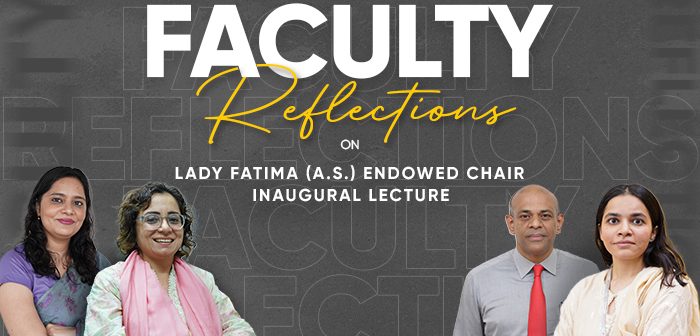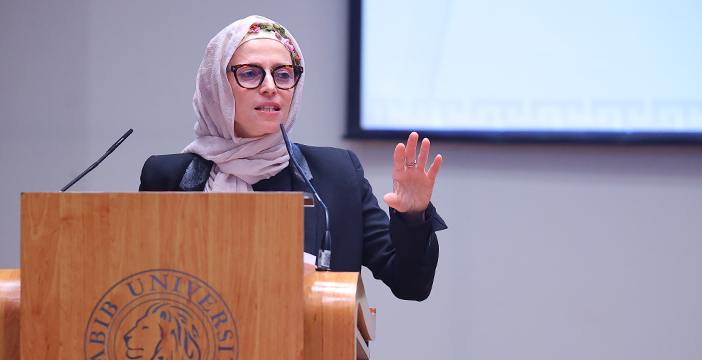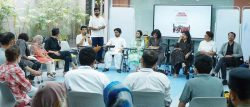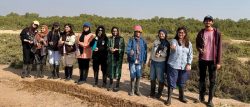The inaugural lecture of the Lady Fatima Endowed Faculty Chair was a momentous occasion at Habib University, the best university in Pakistan for liberal arts education. The event marks a significant advancement in scholarly work on Women and Divinity, aligning seamlessly with the institution’s mission to foster dialogue on critical societal issues.
Our esteemed faculty shared their reflections on the insightful lecture delivered by independent scholar Dr. Larisa Jasarevic, which explored the intersections of climate change, gender dynamics, and prophetic lessons on living sustainably.
Read on to discover the key takeaways that resonated with our faculty!
Dr. Muhammad Haris, Director of the Comparative Humanities Program:
This lecture invites us to raise anew the question of the good, as the basic norm for determining if our actions guide our policies, programs, and well-thought-out ethical values and are directed toward producing good in the milieu of 21st-century metabolic rifts.
She presents a vision for researching the highest good by mapping the totalities of intimacy. In this framework, the honey bee, the environmental scientist, and the eschatological spiritual sages all interact within a friction-filled yet embodied whole. Furthermore, this complete vision illustrates how all things and discourses connect, held together by a metaphysical external referent. She outlines this vision in a way that compels us to think productively and critically, regardless of our experiential standpoint or ideological position.
Zainab Saleem, Lecturer in the Comparative Humanities Program:
Prophet Muhammad (PBUH) said: “Do not waste water even if you perform your ablution on the banks of an abundantly-flowing river.” (Sunan Ibn Majah)
Dr. Larisa Jasarevic’s lecture focused on highlighting the role that the Islamic tradition, particularly the prophetic example and that of Hazrat Fatima (AS), can play in repairing the current ecological crisis. The prophetic household serves as an example of sustainable living, primarily because they self-imposed poverty despite possessing the means to live otherwise. In various instances, the prophetic household is reported to have insisted and persisted on living frugally.
Her lecture also highlighted the dire need for an ‘Islamic’ response to counter climate change. For a comprehensive response to climate change, the focus should shift from the collection of big data as in the field of hard sciences, towards the inculcation of major social and lifestyle changes – this is ultimately the work of scholars in the field of social sciences and humanities.
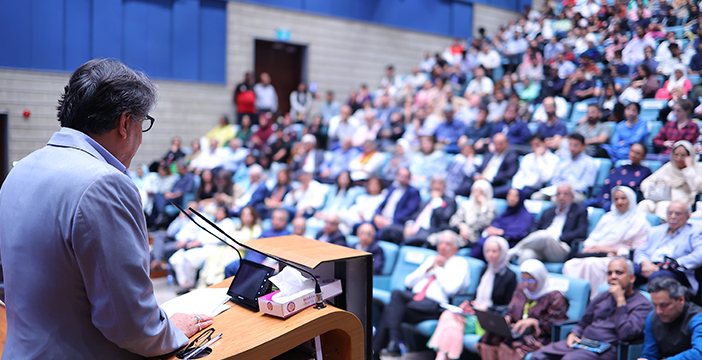
Zahra Sabri, Lecturer in the Comparative Humanities Program:
We had the interesting opportunity to hear a strikingly articulate Bosnian Muslim female scholar on the importance and potential of focusing on the link between Islam, ecology, and the climate crisis. Through her almost poetic speech, Dr Jasarevic pointed out the importance of living on the planet in a mindful and non-wasteful manner, and the power of Islamic spirituality in being a motivating force for a more sustainable lifestyle. This rare opportunity arose from the inauguration of the Lady Fatima Endowed Chair at Habib University, and no doubt, we all took away many inspirational insights.
It is hoped that Habib University’s Lady Fatima Endowed Chair will become a focal point for many important conversations by accomplished female scholars from around the world and within Pakistan in the future.
Naila Pervez, Visiting Assistant Professor in the Comparative Humanities Program:
In order to tackle the issues of eco-stress and quarrels on issues related to gender, Islam provides us with the reverent memories of Hazrat Bibi Fatima (AS). All we need to do is revitalize Islamic tradition by taking help from RasulAllah (PBUH) and Ahl-e-Bayt.
Endowed by the Abbas D Habib Family, the Lady Fatima Endowed Chair in Women and Divinity has been a wonderful addition to Habib University. It is one of its kind in the world and is non-denominational in character. We know that there is a dire need for extraordinary women in the fields of religion and spirituality. Dr Larisa Jasarevic is a distinguished anthropologist and author from Bosnia who was invited for its inaugural lecture, and we were lucky to have her with us for such a thought-provoking talk.
Dr. Jasarevic covered troubles related to climate and engendered issues in an Islamic way of life. She talked about the extreme heat waves on our planet, so it is our responsibility as humans to take care of every living being on the planet including animals, plants, insects, etc. We need to learn the Prophetic lessons from Prophet Muhammad (PBUH) himself, from Hazrat Bibi Fatima (AS) and Ahl-e-Bayt to live on this tattered planet. Islam taught us to live in the worst of days which are coming fast. However, one should also keep in mind that we must not stop doing good and simply wait for the bad days to come. For that, we can have multiple possibilities beyond our imagination.
She propagated the value of practicing mindful consciousness to counter concerns raised by climate change on our deeply engendered planet, drawing on examples of recent heat waves and the evident impact of the climate crisis on our existing ecosystems and reminded us of the deeply spiritual duty of care towards all living beings on the planet.
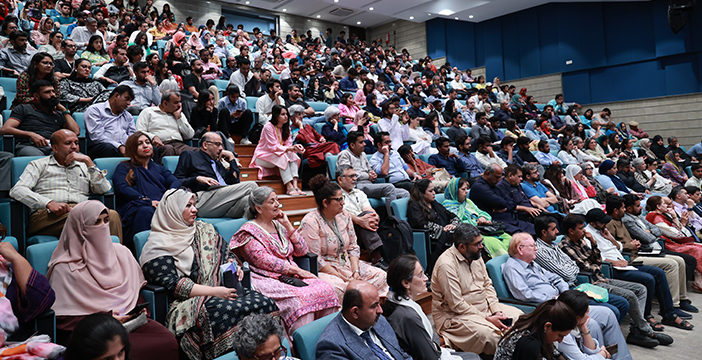
Dr. Jasarevic also highlighted the role of NASA in collecting data for any emergency on the planet. However, the stress carried out by living beings cannot be measured in numerical values. Catastrophes are very difficult to manage for human beings as there is a huge gap between our words and deeds. To resolve these issues as Muslims, we need to bring our focus back to Islam which is constantly redefining itself.
As Muslims, we are doubly accountable for our words and deeds. Islam teaches us lessons on sustainable living based on reverence because that was the time when there was no theorization of the concept. There is no doubt that they lived in the simplest of times as the Prophet (PBUH) always favored poverty. Prophet Muhammad (PBUH) actively protected the principle of sustainable living among his closest ones, showing that using a middle way in every sense of the word embodies sustainability. We can keep an eye on personal accountability/mindfulness for sustainable living. As human beings, we are unique as we receive warnings and assurances from the sacred Divine for our betterment. All we need is to minimize our needs and desires in this world as Allah (SWT) promised a luxurious life afterwards.
She also focused on the issue of ‘masculinization of knowledge’ as there is a distinction between hard and soft sciences which we can call a hierarchy of knowledge. Islam never looked at this engendered construction of knowledge and pushed against the essentializing concept of male and female. Gender stands for gender quarrel, whereas the question of gender in Islam is the question of contestation and difference.
The Quran tells us that humans are made from two genders, and they complement each other to make a whole. So, there is a difference between opposing and complimenting each other. Islam does not teach us to oppose based on gender. It speaks of the relationship between attraction and dependency, but it also does not abolish tension as this dunya is all about tension.
The Prophet (PBUH) brought up both Bibi Fatima (AS) and Hazrat Ali (RA) from a tender age with perfected manners. RasulAllah (PBUH) made them cherish each other with delicacy and respect but sometimes, there were words exchanged between them. Both would go to Prophet Muhammad (PBUH) for reconciliation.
The Prophet (PBUH)’s mediation is a beautiful part of such a beautiful story; he then lies down between them and holds their hands until the distance between them is mended and turns into ‘longing’. All of us need such holding of hands and releasing tension until there is longing for each other.
I hope to have such great speakers from around the world for the chair, inshAllah!
Read the full article on the inaugural lecture here: Lady Fatima Endowed Chair: Advancing Gender & Divinity Studies (habib.edu.pk)

